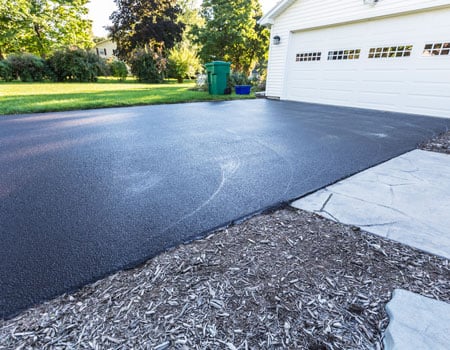
When the snow melts, you may notice more cracks and potholes in your asphalt driveway than there were last fall. Our Southeastern MI asphalt paving contractors recommend you hire driveway pavers for necessary repairs and to learn whether or not total asphalt replacement would be more appropriate.
What can you expect during asphalt paving? Let’s take a look at 7 frequently asked questions we hear from customers so you can feel prepared to repair or repave your driveway this year.
1. When Is the Best Time for Asphalt Driveway Paving?
Most homeowners wait until spring or summer to start driveway paving. For the best results, the ground must be dry and not frozen. If it is raining or snowing heavily the day our paving contractors come to your house, we may reschedule the project in favor of a drier day.
2. How Long Will It Take to Pave My New Driveway?
The length of the project will depend on a variety of factors, including:
- Your schedule
- Weather conditions
- The size of your driveway
- The condition of your driveway’s base
3. What Is the Typical Lifespan for Asphalt Driveways?
With proper installation and maintenance, your driveway may last up to 20 years! Keep in mind, however, that freeze-thaw cycles, improper water drainage, and heavy traffic can reduce your driveway’s lifespan.
Related Post → Prolong the Life of Your Asphalt Surface
4. Do You Recommend Driveway Sealcoating?
Once all the potholes and cracks in your driveway have been filled, we recommend following up with asphalt sealcoating. protects your pavement from UV rays, rain, snow, sleet, and automobile fluids.
Related Post → Pros and Cons of Asphalt Sealcoating
Your blacktop driveway will last much longer with a coat of asphalt sealer. Not only does driveway sealer protect your pavement from the elements, but it also prevents future cracks and potholes.
5. How Long After Paving Can I Drive and Park on My New Driveway?
Our contractors recommend that you wait at least 24 hours before walking on your freshly paved driveway and between 48-72 hours before you drive over it. Otherwise, you can undo the work done and cause rutting, scarring, or unwanted depressions on the new asphalt.
6. What Are the Advantages of Asphalt Over Concrete?
Asphalt is less expensive to repair than concrete and more cost efficient to install. Unlike concrete, asphalt can also easily be resurfaced.
7. How Do I Maintain My Asphalt Driveway?
Maintain your driveway through sealcoating, pothole repair, and crack filling.
While a professional contractor should handle sealcoating and pothole repair, you may be able to fix small cracks on your own. If the crack is less than one inch wide, you can pick up some at your local home improvement store.
Keep in mind that if you have multiple cracks that need to be filled, it may be easier (and less time consuming) to just hire our asphalt paving contractors. While a crack in your driveway may not seem like a big deal at first, it can quickly grow into a larger problem if neglected. The best way to prolong the life of your driveway is to schedule driveway crack repair as needed.
Repair or Repave Your Driveway
Our asphalt contractors serving Southeast MI are dedicated to helping customers prolong the lives of their asphalt driveways. We are proud to serve Clarkston, Brighton/Howell, Milford, Lapeer, and surrounding areas. Call one of our Allied Construction locations today or contact us online for a free estimate.
This blog post has been updated.